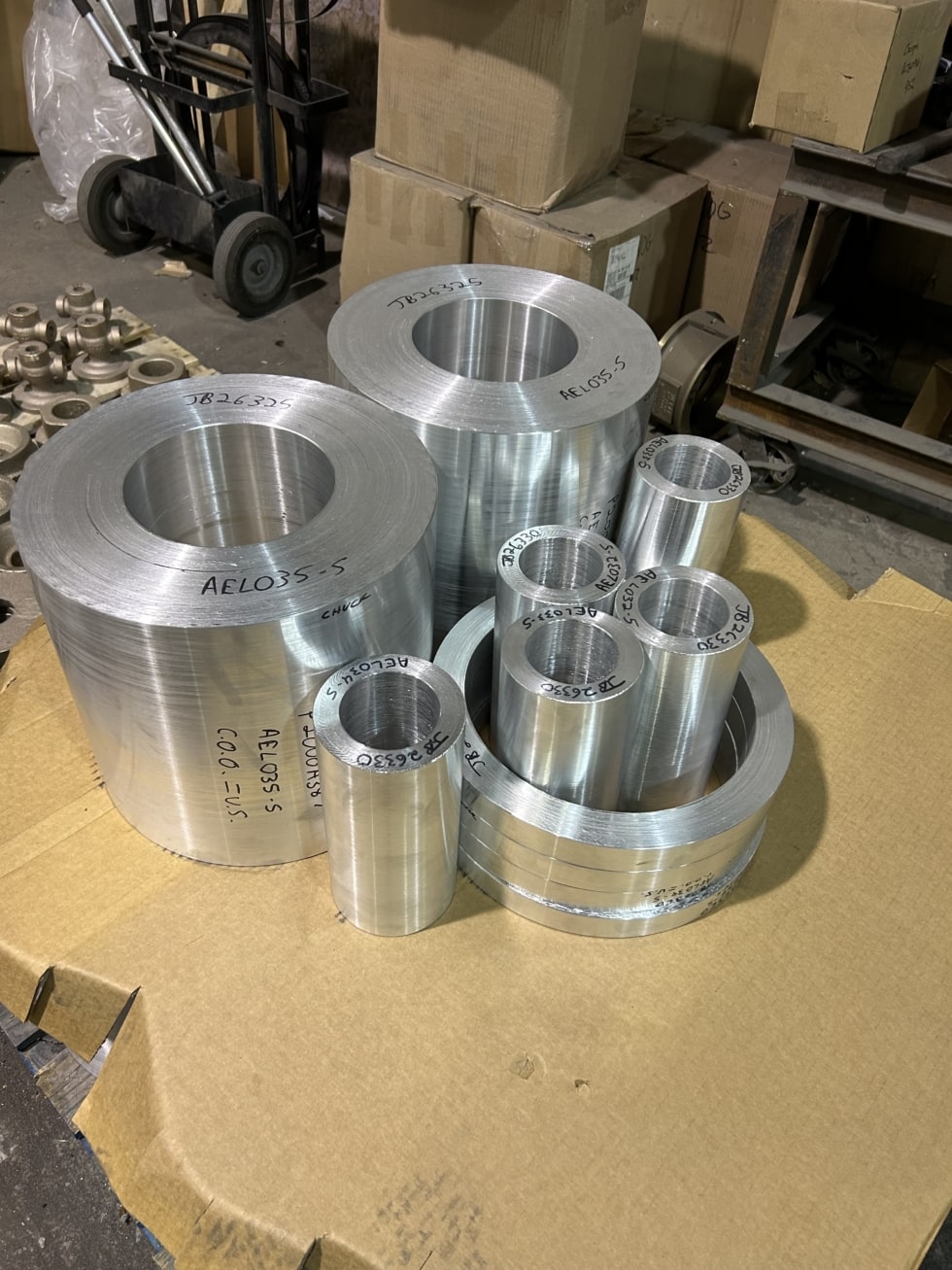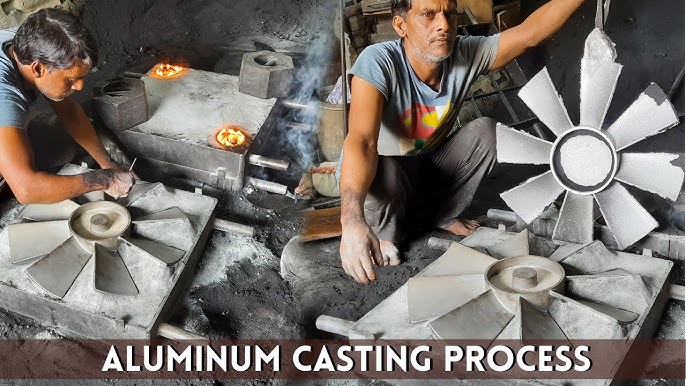Aluminum Foundry Wisconsin is a leader of casting services
Understanding the Conveniences and Innovations in the Aluminum Foundry Market
The Aluminum Foundry industry plays an essential duty in modern production. Its light-weight homes significantly enhance fuel performance, specifically in aerospace and automobile markets. In enhancement, Aluminum's resistance to deterioration warranties durability in numerous applications. As the industry evolves, developments such as advanced recycling and additive manufacturing are improving production methods. Checking out these improvements reveals not only the advantages yet additionally the challenges in advance for Aluminum shops in a rapidly altering market.
The Lightweight Advantage of Aluminum
Aluminum's lightweight nature offers significant advantages throughout different markets, specifically in manufacturing and transportation. Its reduced density permits for the manufacturing of elements that are less complicated to set up and take care of, leading to reduced labor costs and enhanced efficiency. In the automobile field, lighter cars add to enhanced fuel economic climate and reduced emissions, straightening with international sustainability goals. In aerospace, the usage of Aluminum minimizes the total weight of aircraft, which is important for boosting performance and reducing operational costs.
Additionally, Aluminum's lightweight buildings facilitate ingenious layouts that were previously unfeasible with much heavier materials. This flexibility makes it possible for manufacturers to develop complex shapes and frameworks while keeping structural integrity. On the whole, the lightweight benefit of Aluminum not just boosts item performance yet additionally drives innovations in innovation and style, making it a favored product in different applications.
Deterioration Resistance and Sturdiness
The Aluminum Foundry industry is renowned for generating products with superior corrosion resistance, making them ideal for different applications. This residential property, incorporated with improved architectural stability, contributes to the durable efficiency benefits that Aluminum components supply. Consequently, sectors progressively rely upon Aluminum to meet requiring environmental problems without jeopardizing top quality.
Superior Corrosion Resistance
While various metals face substantial challenges from environmental factors, Aluminum stands apart for its premium rust resistance, making it a favored option in lots of applications. This building is mostly as a result of an all-natural oxide layer that creates on the Aluminum surface area, providing a barrier versus moisture and destructive representatives. Unlike various other steels that may rust or break down with time, Aluminum keeps its integrity also in harsh atmospheres, such as coastal areas or industrial settings. Additionally, its light-weight nature combined with rust resistance makes it suitable for applications in aerospace, auto, and marine sectors. In general, Aluminum's phenomenal resilience not only improves product longevity yet likewise lowers upkeep costs, offering a compelling advantage for consumers and manufacturers alike.
Enhanced Architectural Honesty
Designers and designers progressively identify the importance of enhanced structural stability in modern applications, where both rust resistance and sturdiness are critical. Aluminum alloys, known for their light-weight residential properties, likewise exhibit phenomenal resistance to corrosion, making them suitable for severe environments. The ingenious methods used in the Aluminum Foundry industry add substantially to generating parts with boosted durability. Advanced casting procedures and alloy make-ups are tailored to meet certain efficiency needs, ensuring that frameworks can endure extreme conditions without endangering honesty. Furthermore, surface therapies and layers boost the life-span of Aluminum items, better mitigating degeneration in time. This focus on boosted structural integrity not only extends the functionality of materials but likewise lowers upkeep prices, solidifying Aluminum's placement as a material of selection in various markets.
Durable Performance Perks
Durable performance in Aluminum parts is largely credited to their superior rust resistance and toughness. Unlike numerous metals, Aluminum naturally develops a safety oxide layer, which protects against rust and damage in different environments, including aquatic and industrial settings. This integral property significantly expands the lifespan of Aluminum items, minimizing upkeep and replacement expenses. In addition, the lightweight nature of Aluminum improves its applicability across industries without endangering strength. The product's resistance to put on and tear additionally adds to its reliability in demanding applications, making it an excellent selection for automotive, aerospace, and building and construction sectors. As markets progressively prioritize sustainability and long life, Aluminum's efficiency benefits align with modern engineering requirements, strengthening its function in ingenious manufacturing procedures.
Environmental Impact and Sustainability
 As the Aluminum Foundry market progresses, it progressively focuses on ecological impact and sustainability, acknowledging the need for liable practices in the face of climate change. Initiatives to decrease waste and energy consumption are at the forefront, with numerous foundries taking on recycling efforts to reclaim Aluminum scrap. This not here only reduces resources use but also especially lowers power expenditure, as recycled Aluminum requires just a fraction of the energy compared to main manufacturing.
As the Aluminum Foundry market progresses, it progressively focuses on ecological impact and sustainability, acknowledging the need for liable practices in the face of climate change. Initiatives to decrease waste and energy consumption are at the forefront, with numerous foundries taking on recycling efforts to reclaim Aluminum scrap. This not here only reduces resources use but also especially lowers power expenditure, as recycled Aluminum requires just a fraction of the energy compared to main manufacturing.Improvements in exhausts regulate modern technologies are being applied to reduce air pollutants, straightening operations with stricter environmental regulations. Factories are likewise checking out alternate power resources, such as solar and wind, to power their facilities sustainably. By cultivating partnership with stakeholders, the industry aims to establish cutting-edge solutions that boost ecological stewardship. Jointly, these initiatives highlight a dedication to reducing the Aluminum Foundry's carbon footprint while advertising a round economic climate within the manufacturing market.
Advanced Manufacturing Techniques
 Revolutionizing manufacturing processes, the Aluminum Foundry industry is progressively incorporating advanced manufacturing strategies to boost efficiency and precision. Techniques such as computer system mathematical control (CNC) machining and additive manufacturing have actually arised as crucial elements in optimizing manufacturing operations. CNC machining permits high-precision part manufacture, greatly lowering product waste and manufacturing time. At the same time, additive production opens new methods for complicated geometries and lightweight layouts that were previously tough to attain.
Revolutionizing manufacturing processes, the Aluminum Foundry industry is progressively incorporating advanced manufacturing strategies to boost efficiency and precision. Techniques such as computer system mathematical control (CNC) machining and additive manufacturing have actually arised as crucial elements in optimizing manufacturing operations. CNC machining permits high-precision part manufacture, greatly lowering product waste and manufacturing time. At the same time, additive production opens new methods for complicated geometries and lightweight layouts that were previously tough to attain.Additionally, the deployment of automation and robotics in Aluminum factories improves procedures, minimizes human error, and boosts worker security. These innovations assist in a more receptive manufacturing environment, making it possible for manufacturers to adjust promptly to market needs. The integration of sophisticated simulation software program even more enhances the style and testing stages, leading to superior item high quality. Collectively, these strategies not only enhance operational performance yet also foster development, positioning the Aluminum Foundry industry at the center of modern manufacturing.
Technologies in Reusing Procedures
The Aluminum Foundry industry is not just advancing in producing methods however is additionally making significant strides in recycling processes. Advancements are emerging to improve the efficiency of reusing techniques, decreasing power intake and enhancing sustainability. Advanced sorting innovations, such as automated optical sorting, enable the recognition and separation of Aluminum from other products with high precision. This leads look at this web-site to a greater top quality of recycled Aluminum, which is essential for keeping the stability of the end products.
Closed-loop recycling systems are being executed, enabling suppliers to reuse Aluminum scrap within their very own manufacturing procedures. This lessens waste and promotes a round economic climate. Additionally, research into new recycling strategies, such as hydrometallurgical procedures, offers the capacity for recuperating Aluminum from complicated waste streams. These advancements not just add to lowering the carbon footprint of the Aluminum Foundry sector but additionally reinforce its financial feasibility in a significantly eco conscious market.
Applications Across Different Industries
Countless sectors are progressively identifying the flexibility and benefits of Aluminum Foundry items, leading to prevalent applications throughout industries such as auto, aerospace, customer, and building goods. In the automotive market, Aluminum spreadings add to lightweight automobile designs, boosting fuel effectiveness and performance. Aerospace suppliers make use of Aluminum components for their strength-to-weight ratio, vital for aircraft frameworks and parts.
In building and construction, Aluminum is favored for its longevity and resistance to corrosion, making it ideal for home window structures, roof, and structural assistances. Durable goods likewise gain from Aluminum Foundry products, as seen in cookware, electronic devices, and packaging, where light-weight and recyclable products are important.
The adaptability of Aluminum Foundry strategies permits specific requirements and intricate layouts, accommodating the diverse requirements of these industries. Therefore, Aluminum Foundry products are coming to be integral to modern manufacturing procedures across various sectors.
Future Patterns in Aluminum Foundries
As sectors remain to evolve, Aluminum shops are poised to welcome a number of key patterns that guarantee to enhance effectiveness and sustainability. One popular fad is the increasing fostering of electronic innovations, consisting of automation and synthetic intelligence, which enhance operations and enhance quality assurance. In enhancement, the press towards lasting methods is leading foundries to purchase recycling innovations, greatly decreasing waste and power consumption.
 An additional arising pattern is making use of innovative alloys and materials, satisfying the expanding need for lightweight and resilient elements across different sectors (Aluminum Foundry). The assimilation of additive manufacturing methods is anticipated to change component style, supplying modification and decreasing lead times.
An additional arising pattern is making use of innovative alloys and materials, satisfying the expanding need for lightweight and resilient elements across different sectors (Aluminum Foundry). The assimilation of additive manufacturing methods is anticipated to change component style, supplying modification and decreasing lead times.Partnership with research establishments is additionally expected to drive advancement, as factories seek to develop new processes and products. Aluminum Foundry. Collectively, these fads show a transformative future for the Aluminum Foundry market, aligning with broader objectives of sustainability and effectiveness
Frequently Asked Inquiries
What Are the Normal Costs Connected With Aluminum Foundry Manufacturing?
The common expenses connected with Aluminum Foundry production consist of basic materials, labor, power, equipment upkeep, and overhead costs. These variables collectively affect the total economic investment required for reliable Aluminum spreading operations.
Just How Does Aluminum Compare to Various Other Metals in Strength?
Aluminum, while lighter than several steels, displays outstanding strength-to-weight proportions. Contrasted to steel, Aluminum is much less strong yet offers excellent rust resistance, making it a favorable choice in applications where weight and longevity are essential.
What Safety and security Procedures Are in Area in Aluminum Foundries?
Precaution in Aluminum factories generally include mandatory individual protective devices, air flow systems to manage fumes, routine here are the findings equipment upkeep, training programs for workers, and adherence to rigorous safety laws to decrease threats linked with liquified steel handling.
How Is Quality Assurance Managed in Aluminum Casting Processes?
Quality control in Aluminum spreading processes entails strenuous evaluations at different phases, consisting of resources evaluation, process tracking, and end product testing. Strategies such as analytical process control and non-destructive testing warranty adherence to industry requirements.
What Qualifications Are Necessary for Aluminum Foundry Providers?
The importance of certifications for Aluminum Foundry distributors consists of ISO 9001 for high quality management, ISO 14001 for environmental management, and industry-specific standards like ASTM and SAE, ensuring conformity, safety, and dependability in making procedures.
The Aluminum Foundry industry plays an essential function in modern production. The Aluminum Foundry sector is renowned for producing materials with superior deterioration resistance, making them excellent for numerous applications. Reinventing production processes, the Aluminum Foundry industry is significantly incorporating advanced production strategies to enhance performance and precision. The Aluminum Foundry industry is not only advancing in producing techniques yet is additionally making significant strides in reusing procedures. As markets continue to advance, Aluminum factories are positioned to accept numerous vital fads that guarantee to boost effectiveness and sustainability.